Charles E W Bean, Diaries, AWM38 3DRL 606/237/1 - October 1914 - 1918 - Part 3
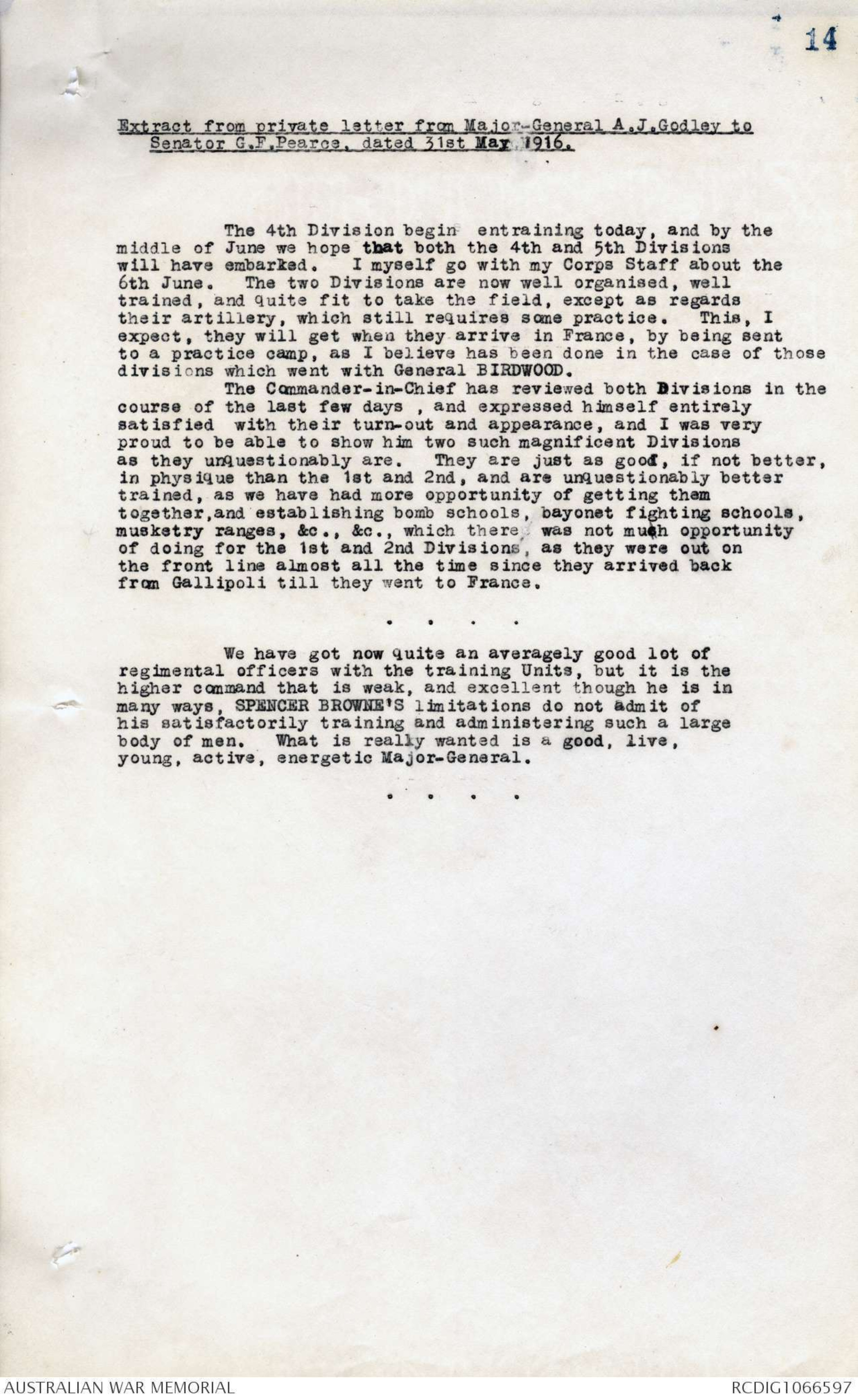
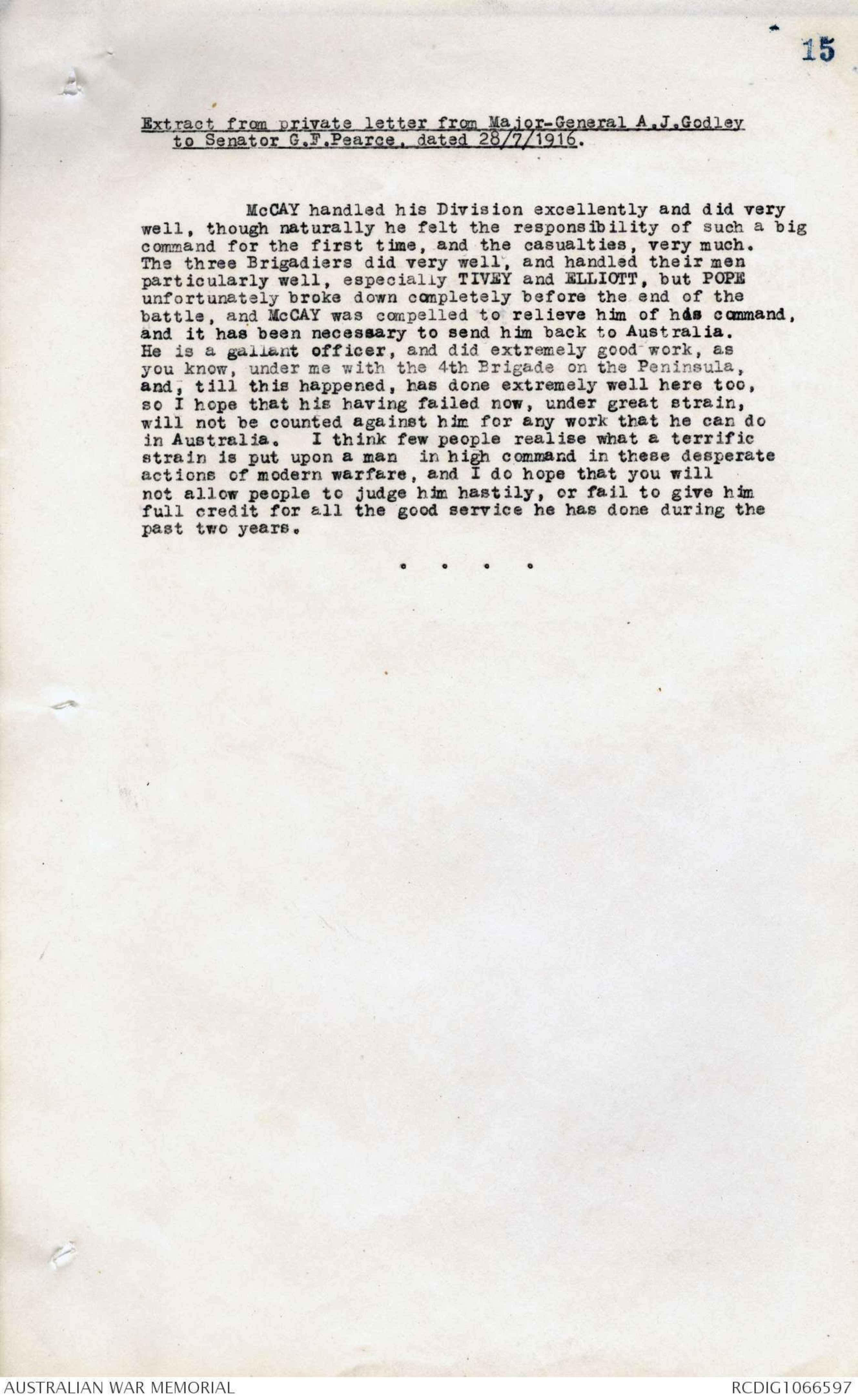
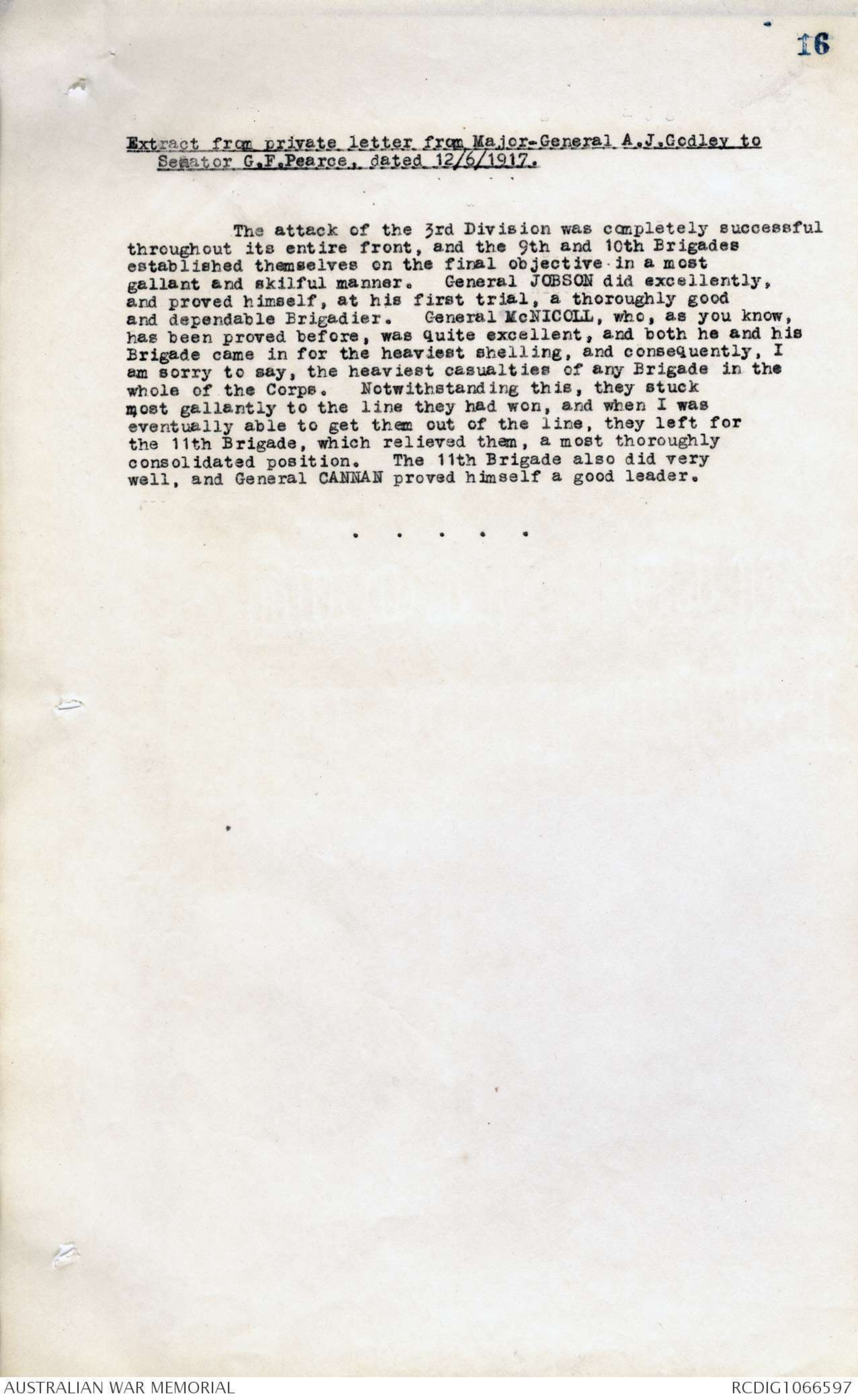
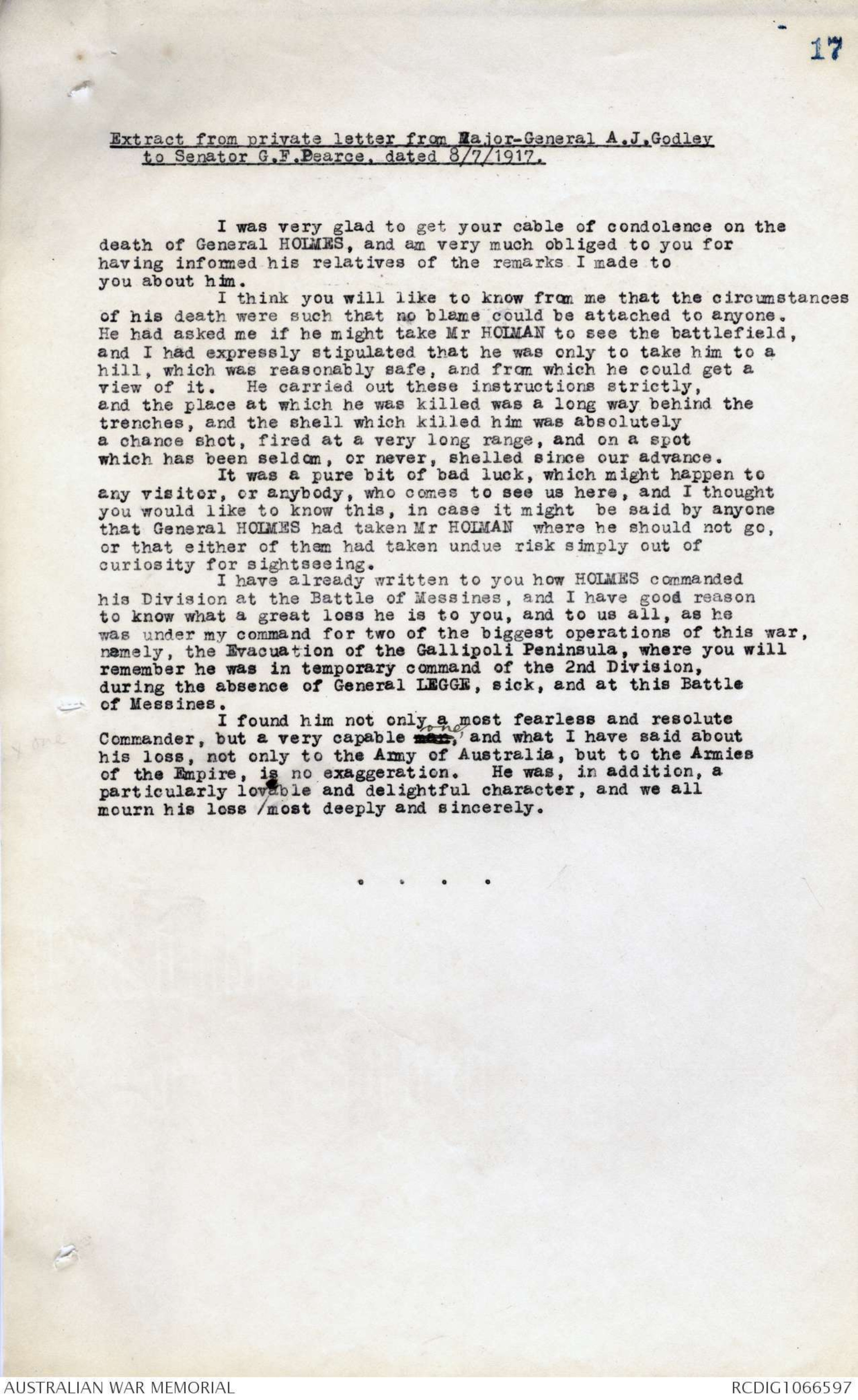
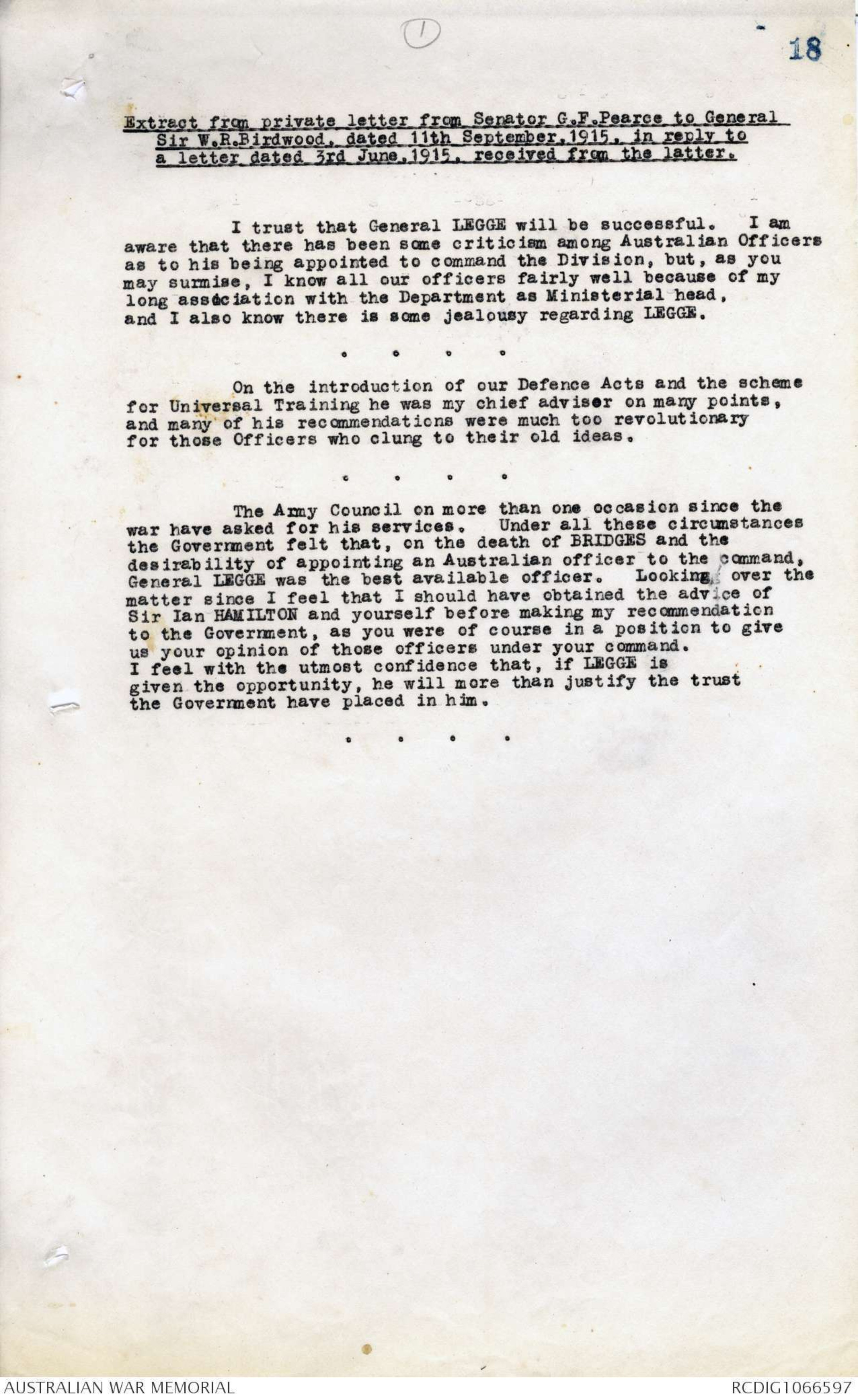
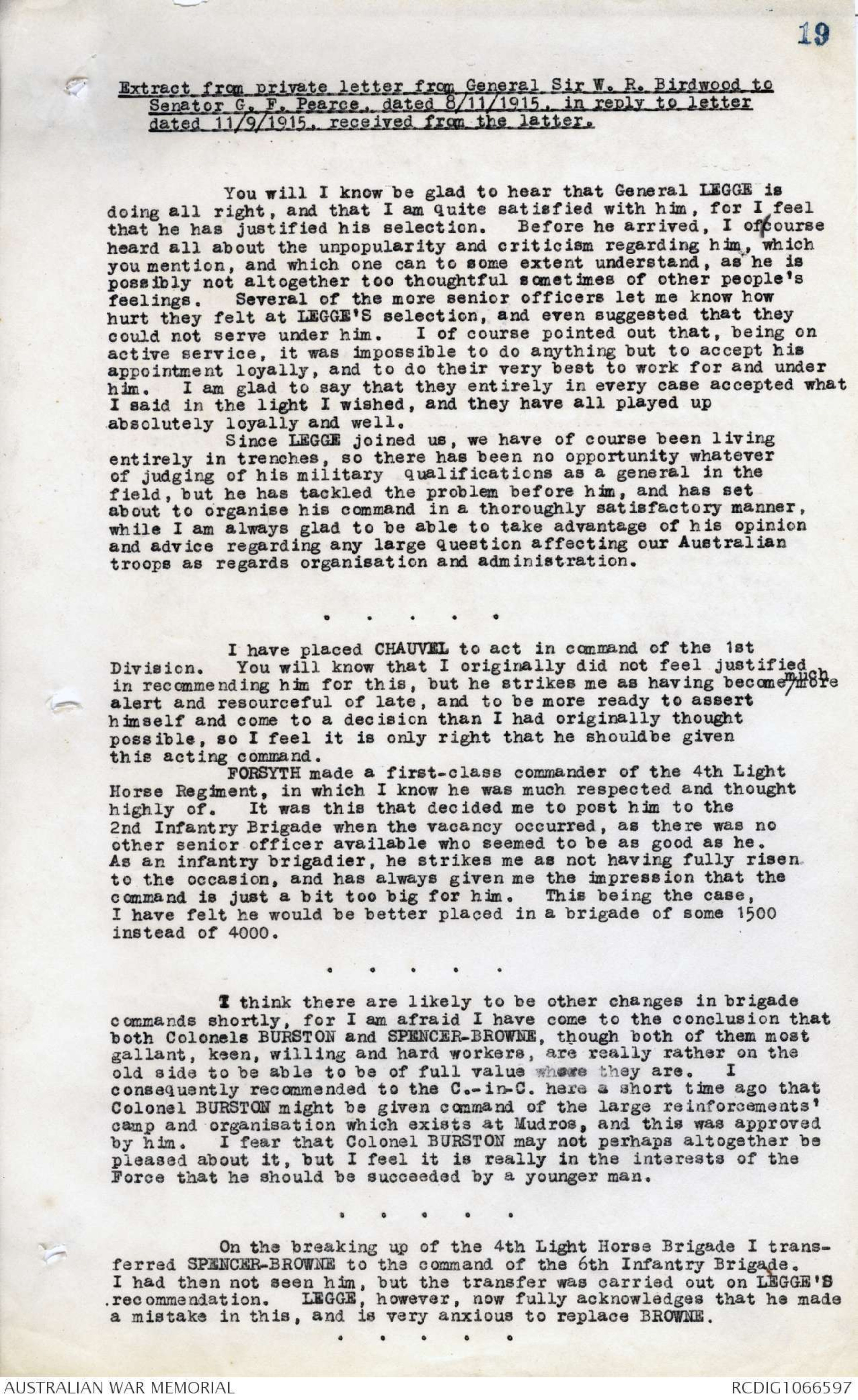
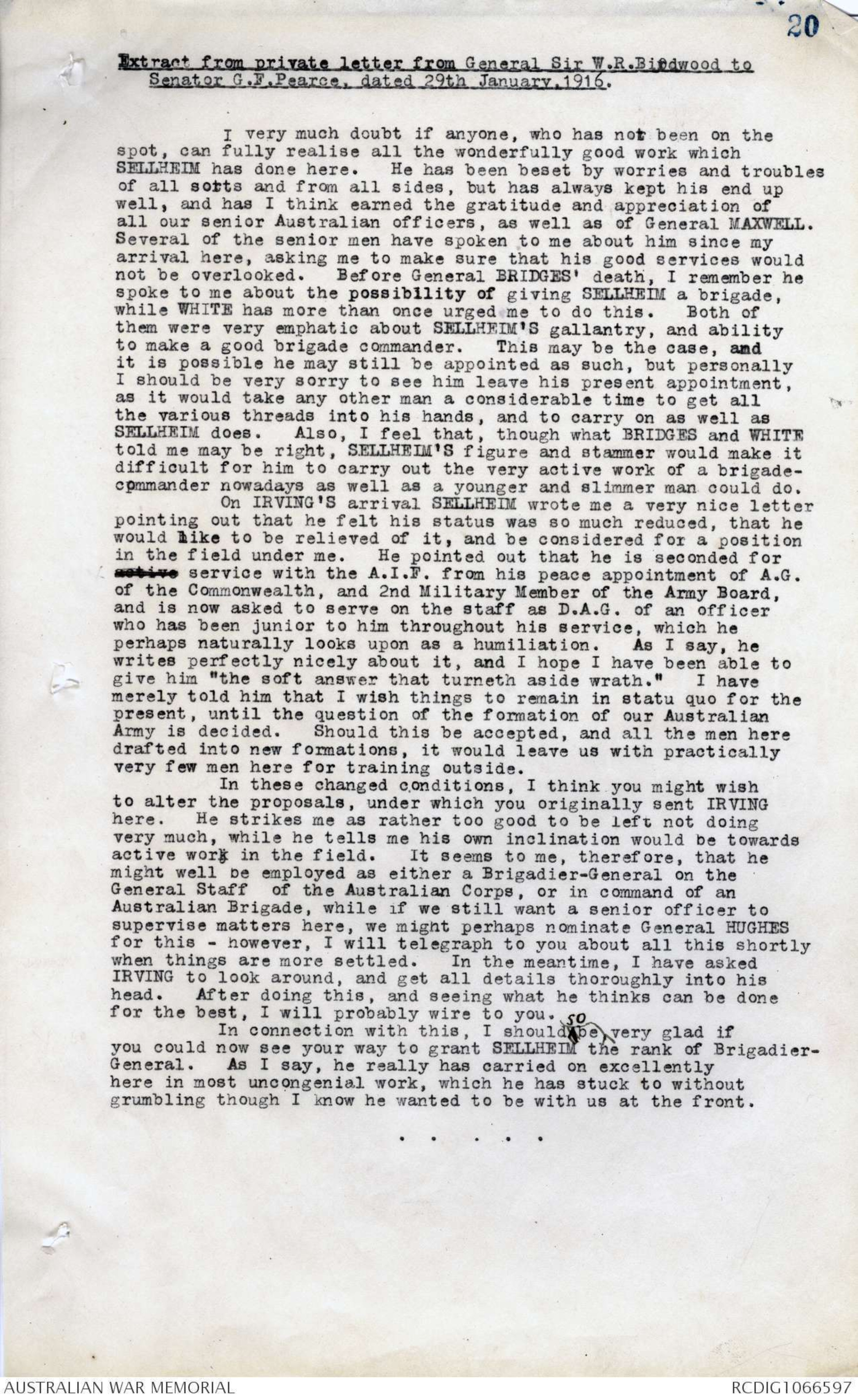
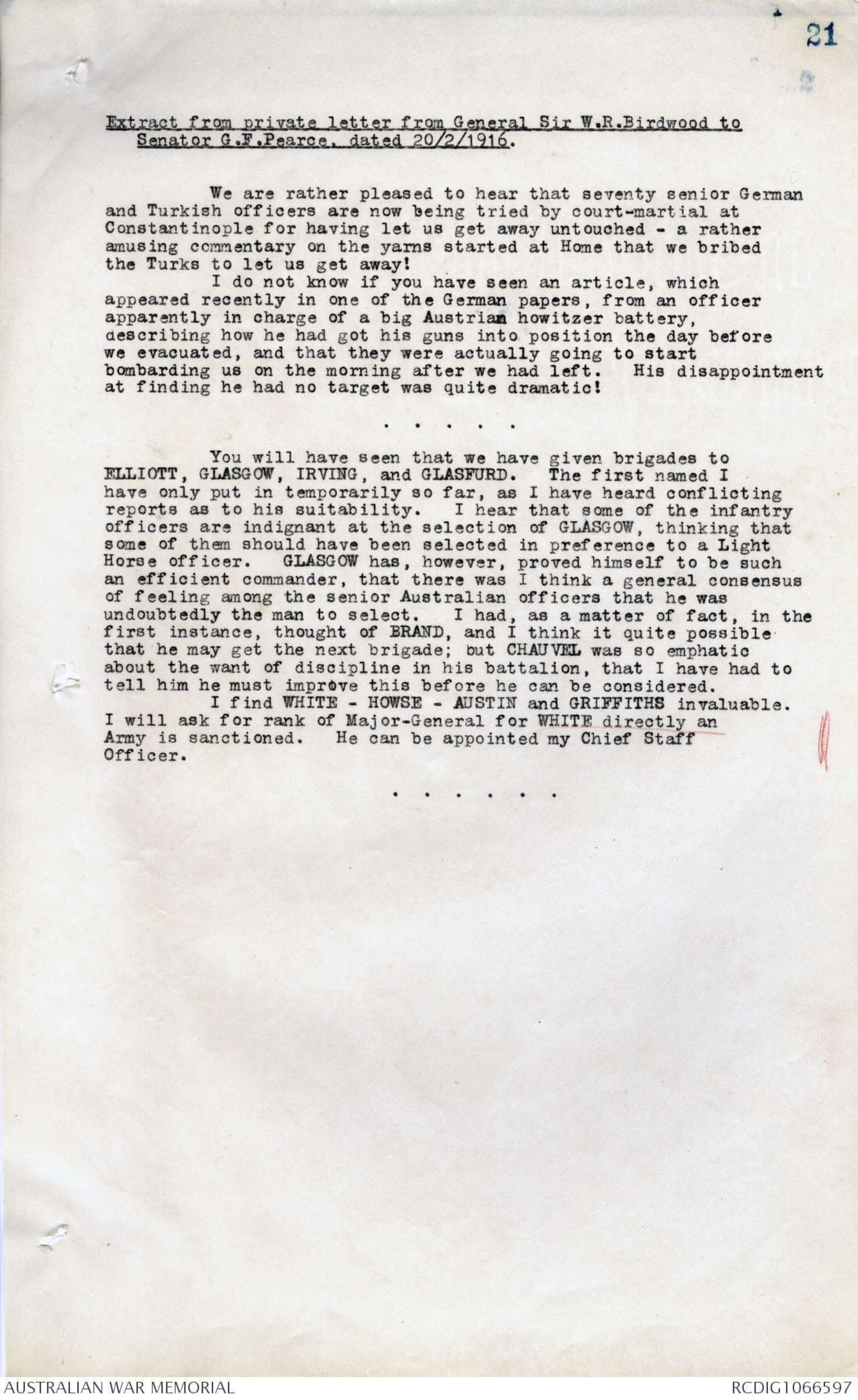
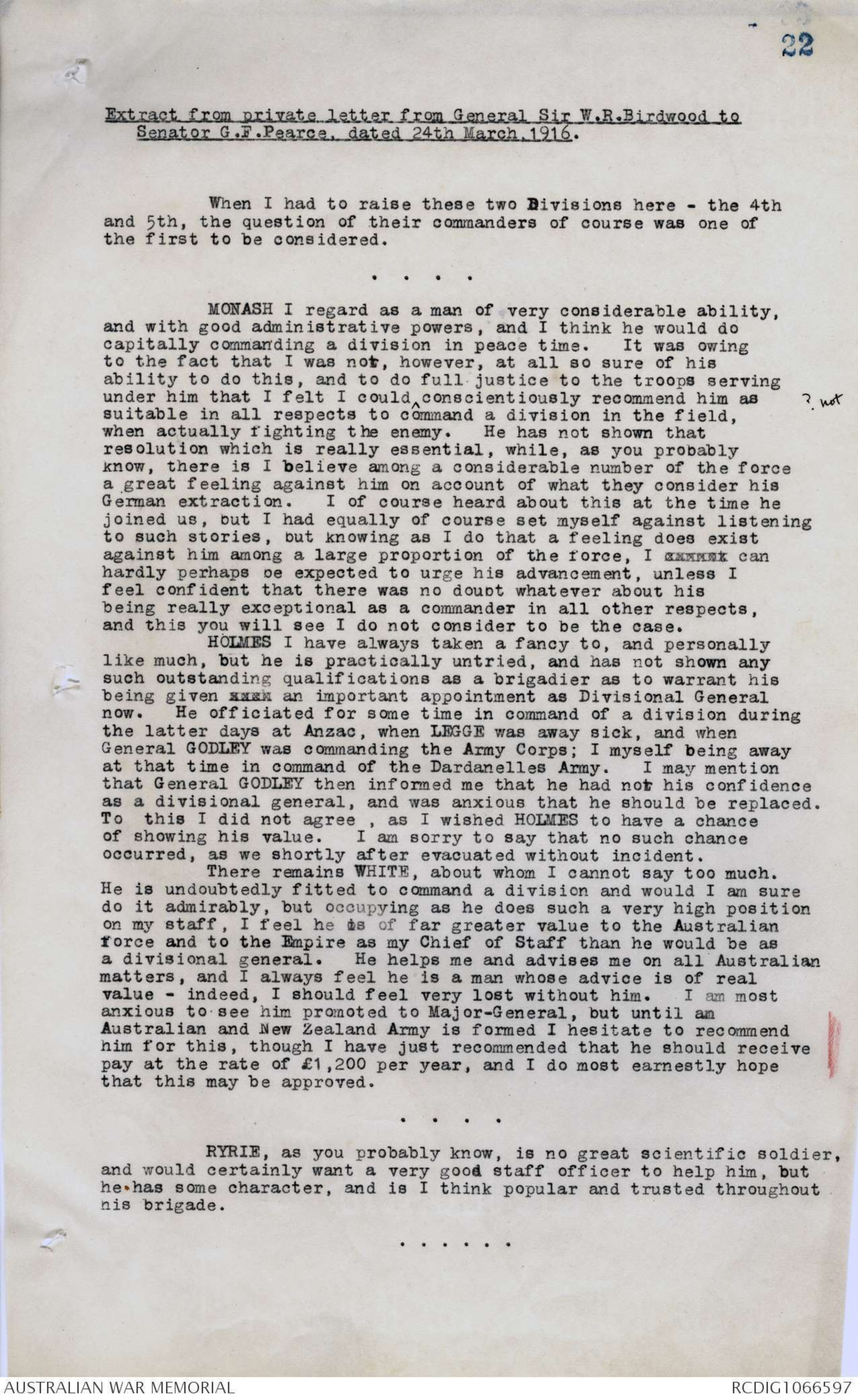
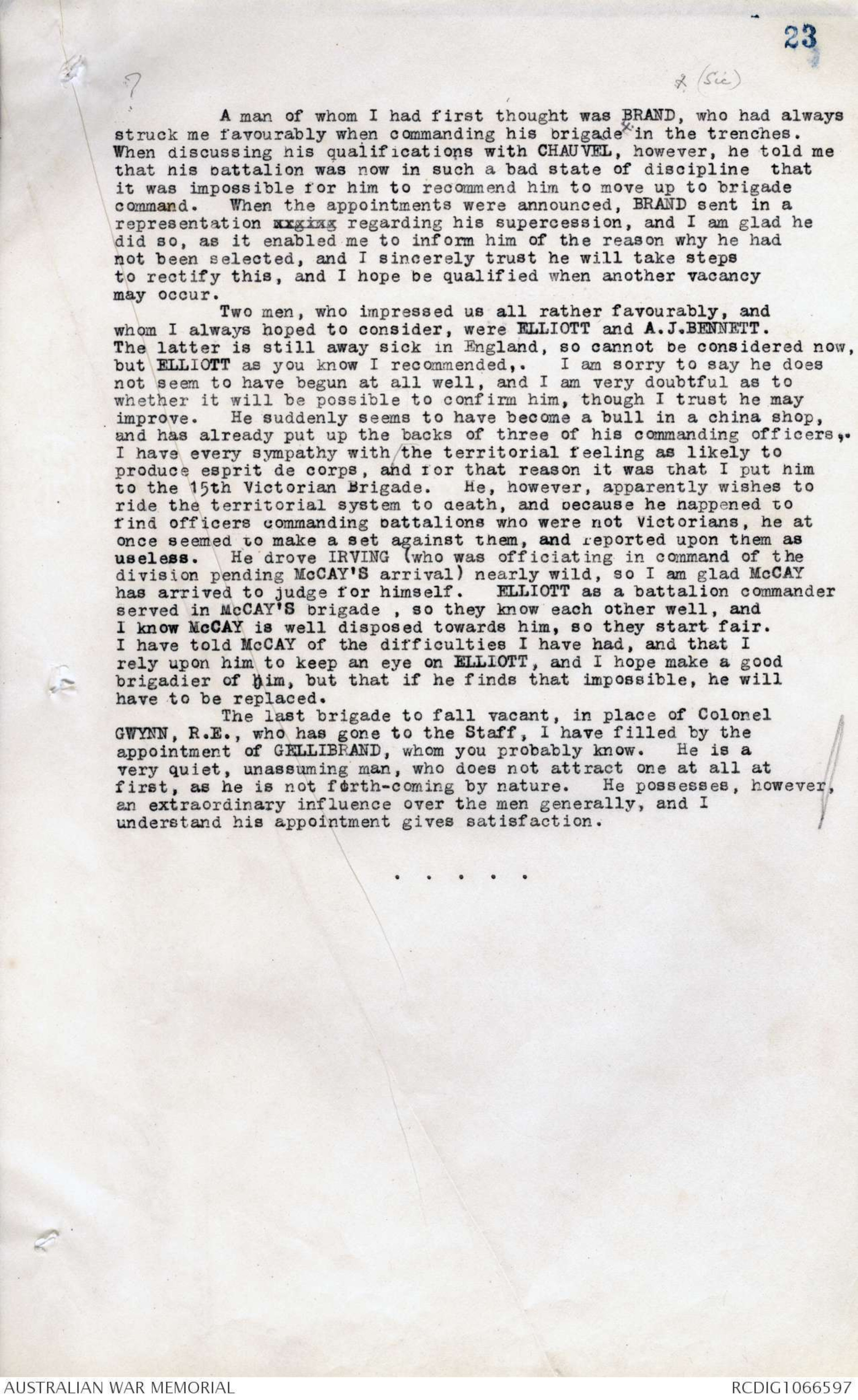
14
Extract from private letter from Major-General A.J.Godley to
Senator G.F. Pearce, dated 31st May, 1916.
The 4th Division begin entraining today, and by the
middle of June we hope that both the 4th and 5th Divisions
will have embarked. I myself go with my Corps Staff about the
6th June. The two Divisions are now well organised, well
trained, and quite fit to take the field, except as regards
their artillery, which still requires some practice. This, I
expect, they will get when they arrive in France, by being sent
to a practice camp, as I believe has been done in the case of those
divisions which went with General BIRDWOOD.
The Commander-in-Chief has reviewed both Divisions in the
course of the last few days, and expressed himself entirely
satisfied with their turn-out and appearance, and I was very
proud to be able to show him two such magnificent Divisions
as they unquestionably are. They are just as good, if not better,
in physique than the 1st and 2nd, and are unquestionably better
trained, as we have had more opportunity of getting them
together, and establishing bomb schools, bayonet fighting schools,
musketry ranges, &c., &c., which there was not much opportunity
of doing for the 1st and 2nd Divisions, as they were out on
the front line almost all the time since they arrived back
from Gallipoli till they went to France.
We have got now quite an averagely good lot of
regimental officers with the training Units, but it is the
higher command that is weak, and excellent though he is in
many ways, SPENCER BROWNE'S limitations do not admit of
his satisfactorily training and administering such a large
body of men. What is really wanted is a good, live,
young, active, energetic Major-General.
15
Extract from private letter from Major-General A.J.Godley
to Senator G.F Pearce, dated 28/7/1916.
McCAY handled his Division excellently and did very
well, though naturally he felt the responsibility of such a big
command for the first time, and the casualties, very much.
The three Brigadiers did very well, and handled their men
particularly well, especially TIVEY and ELLIOTT, but POPE
unfortunately broke down completely before the end of the
battle, and McCAY was compelled to relieve him of his command,
and it has been necessary to send him back to Australia.
He is a gallant officer, and did extremely good work, as
you know, under me with the 4th Brigade on the Peninsula,
and, till this happened, has done extremely well here too,
so I hope that his having failed now, under great strain,
will not be counted against him for any work that he can do
in Australia. I think few people realise what a terrific
strain is put upon a man in high command in these desperate
actions of modern warfare, and I do hope that you will
not allow people to judge him hastily, or fail to give him
full credit for all the good service he has done during the
past two years.
16
Extract from private letter from Major-General A.J.Godley to
Senator G.F.Pearce, dated 12/6/1917.
The attack of the 3rd Division was completely successful
throughout its entire front, and the 9th and 10th Brigades
established themselves on the final objective in a most
gallant and skilful manner. General JOBSON did excellently,
and proved himself, at his first trial, a thoroughly good
and dependable Brigadier. General McNICOLL, who, as you know,
has been proved before, was quite excellent, and both he and his
Brigade came in for the heaviest shelling, and consequently, I
am sorry to say, the heaviest casualties of any Brigade in the
whole of the Corps. Notwithstanding this, they stuck
most gallantly to the line they had won, and when I was
eventually able to get them out of the line, they left for
the 11th Brigade, which relieved them, a most thoroughly
consolidated position. The 11th Brigade also did very
well, and General CANNAN proved himself a good leader.
17
Extract from private letter from Major-General A.J.Godley
to Senator G.F.Pearce, dated 8/7/1917.
I was very glad to get your cable of condolence on the
death of General HOLMES, and am very much obliged to you for
having informed his relatives of the remarks I made to
you about him.
I think you will like to know from me that the circumstances
of his death were such that no blame could be attached to anyone.
He had asked me if he might take Mr HOLMAN to see the battlefield,
and I had expressly stipulated that he was only to take him to a
hill, which was reasonably safe, and from which he could get a
view of it. He carried out these instructions strictly,
and the place at which he was killed was a long way behind the
trenches, and the shell which killed him was absolutely
a chance shot, fired at a very long range, and on a spot
which has been seldom, or never, shelled since our advance.
It was a pure bit of bad luck, which might happen to
any visitor, or anybody, who comes to see us here, and I thought
you would like to know this, in case it might be said by anyone
that General HOLMES had taken Mr HOLMAN where he should not go,
or that either of them had taken undue risk simply out of
curiosity for sightseeing.
I have already written to you how HOLMES commanded
his Division at the Battle of Messines, and I have good reason
to know what a great loss he is to you, and to us all, as he
was under my command for two of the biggest operations of this war,
namely, the Evacuation of the Gallipoli Peninsula, where you will
remember he was in temporary command of the 2nd Division,
during the absence of General LEGGE, sick, and at this Battle
of Messines.
I found him not only a most fearless and resolute
Commander, but a very capable man one, and what I have said about
his loss, not only to the Army of Australia, but to the Armies
of the Empire, is no exaggeration. He was, in addition, a
particularly loveable and delightful character, and we all
mourn his loss most deeply and sincerely.
1
18
Extract from private letter from Senator G.F.Pearce to General
Sir W.R.Birdwood, dated 11th September, 1915, in reply to
a letter dated 3rd June, 1915. received from the latter.
I trust that General LEGGE will be successful. I am
aware that there has been some criticism among Australian Officers
as to his being appointed to command the Division, but, as you
may surmise, I know all our officers fairly well because of my
long association with the Department as Ministerial head,
and I also know there is some jealousy regarding LEGGE.
On the introduction of our Defence Acts and the scheme
for Universal Training he was my chief adviser on many points,
and many of his recommendations were much too revolutionary
for those Officers who clung to their old ideas.
The Army Council on more than one occasion since the
war have asked for his services. Under all these circumstances
the Government felt that, on the death of BRIDGES and the
desirability of appointing an Australian officer to the command,
General LEGGE was the best available officer. Looking over the
matter since I feel that I should have obtained the advice of
Sir Ian HAMILTON and yourself before making my recommendation
to the Government, as you were of course in a position to give
us your opinion of those officers under your command.
I feel with the utmost confidence that, if LEGGE is
given the opportunity, he will more than justify the trust
the Government have placed in him.
19
Extract from private letter from General Sir W. R. Birdwood to
Senator G. F. Pearce, dated 8/11/1915, in reply to letter
dated 11/9/1915, received from the latter.
You will I know be glad to hear that General LEGGE is
doing all right, and that I am quite satisfied with him, for I feel
that he has justified his selection. Before he arrived, I of/course
heard all about the unpopularity and criticism regarding him, which
you mention, and which one can to some extent understand, as he is
possibly not altogether too thoughtful sometimes of other people's
feelings. Several of the more senior officers let me know how
hurt they felt at LEGGE'S selection, and even suggested that they
could not serve under him. I of course pointed out that, being on
active service, it was impossible to do anything but to accept his
appointment loyally, and to do their very best to work for and under
him. I am glad to say that they entirely in every case accepted what
I said in the light I wished, and they have all played up
absolutely loyally and well.
Since LEGGE joined us, we have of course been living
entirely in trenches, so there has been no opportunity whatever
of judging of his military qualifications as a general in the
field, but he has tackled the problem before him, and has set
about to organise his command in a thoroughly satisfactory manner,
while I am always glad to be able to take advantage of his opinion
and advice regarding any large question affecting our Australian
troops as regards organisation and administration.
I have placed CHAUVEL to act in command of the 1st
Division. You will know that I originally did not feel justified
in recommending him for this, but he strikes me as having become ^much more
alert and resourceful of late, and to be more ready to assert
himself and come to a decision than I had originally thought
possible, so I feel it is only right that he should be given
this acting command.
FORSYTH made a first-class commander of the 4th Light
Horse Regiment, in which I know he was much respected and thought
highly of. It was this that decided me to post him to the
2nd Infantry Brigade when the vacancy occurred, as there was no
other senior officer available who seemed to be as good as he.
As an infantry brigadier, he strikes me as not having fully risen
to the occasion, and has always given me the impression that the
command is just a bit too big for him. This being the case,
I have felt he would be better placed in a brigade of some 1500
instead of 4000.
I think there are likely to be other changes in brigade
commands shortly, for I am afraid I have come to the conclusion that
both Colonels BURSTON and SPENCER-BROWNE, though both of them most
gallant, keen, willing and hard workers, are really rather on the
old side to be able to be of full value where they are. I
consequently recommended to the C.-in-C. here a short time ago that
Colonel BURSTON might be given command of the large reinforcements'
camp and organisation which exists at Mudros, and this was approved
by him. I fear that Colonel BURSTON may not perhaps altogether be
pleased about it, but I feel it is really in the interests of the
Force that he should be succeeded by a younger man.
On the breaking up of the 4th Light Horse Brigade I transferred
SPENCER-BROWNE to the command of the 6th Infantry Brigade.
I had then not seen him, but the transfer was carried out on LEGGE'S
recommendation. LEGGE, however, now fully acknowledges that he made
a mistake in this, and is very anxious to replace BROWNE.
20
Extract from private letter from General Sir W.R.Birdwood to
Senator G.F. Pearce, dated 29th January, 1916.
I very much doubt if anyone, who has not been on the
spot, can fully realise all the wonderfully good work which
SELLHELM has done here. He has been beset by worries and troubles
of all sorts and from all sides, but has always kept his end up
well, and has I think earned the gratitude and appreciation of
all our senior Australian officers, as well as of General MAXWELL.
Several of the senior men have spoken to me about him since my
arrival here, asking me to make sure that his good services would
not be overlooked. Before General BRIDGES' death, I remember he
spoke to me about the possibility of giving SELLHEIM a brigade,
while WHITE has more than once urged me to do this. Both of
them were very emphatic about SELLHEIM'S gallantry, and ability
to make a good brigade commander. This may be the case, and
it is possible he may still be appointed as such, but personally
I should be very sorry to see him leave his present appointment,
as it would take any other man a considerable time to get all
the various threads into his hands, and to carry on as well as
SELLHEIM does. Also, I feel that, though what BRIDGES and WHITE
told me may be right, SELLHEIM'S figure and stammer would make it
difficult for him to carry out the very active work of a brigade- commander
nowadays as well as a younger and slimmer man could do.
On IRVING'S arrival SELLHEIM wrote me a very nice letter
pointing out that he felt his status was so much reduced, that he
would like to be relieved of it, and be considered for a position
in the field under me. He pointed out that he is seconded foractive service with the A.I.F. from his peace appointment of A.G.
of the Commonwealth, and 2nd Military Member of the Army Board,
and is now asked to serve on the staff as D.A.G. of an officer
who has been junior to him throughout his service, which he
perhaps naturally looks upon as a humiliation. As I say, he
writes perfectly nicely about it, and I hope I have been able to
give him "the soft answer that turneth aside wrath." I have
merely told him that I wish things to remain in statu quo for the
present, until the question of the formation of our Australian
Army is decided. Should this be accepted, and all the men here
drafted into new formations, it would leave us with practically
very few men here for training outside.
In these changed conditions, I think you might wish
to alter the proposals, under which you originally sent IRVING
here. He strikes me as rather too good to be left not doing
very much, while he tells me his own inclination would be towards
active work in the field. It seems to me, therefore, that he
might well be employed as either a Brigadier-General on the
General Staff, of the Australian Corps, or in command of an
Australian Brigade, while if we still want a senior officer to
supervise matters here, we might perhaps nominate General HUGHES
for this - however, I will telegraph to you about all this shortly
when things are more settled. In the meantime, I have asked
IRVING to look around, and get all details thoroughly into his
head. After doing this, and seeing what he thinks can be done
for the best, I will probably wire to you.
In connection with this, I should be ^so very glad if
you could now see your way to grant SELLHEIM the rank of Brigadier-General.
As I say, he really has carried on excellently
here in most uncongenial work, which he has stuck to without
grumbling though I know he wanted to be with us at the front.
21
Extract from private letter from General Sir W.R.Birdwood to
Senator G.F. Pearce, dated 20/2/1916.
We are rather pleased to hear that seventy senior German
and Turkish officers are now being tried by court-martial at
Constantinople for having let us get away untouched - a rather
amusing commentary on the yarns started at Home that we bribed
the Turks to let us get away!
I do not know if you have seen an article, which
appeared recently in one of the German papers, from an officer
apparently in charge of a big Austrian howitzer battery,
describing how he had got his guns into position the day before
we evacuated, and that they were actually going to start
bombarding us on the morning after we had left. His disappointment
at finding he had no target was quite dramatic!
You will have seen that we have given brigades to
ELLIOTT, GLASGOW, IRVING, and GLASFURD. The first named I
have only put in temporarily so far, as I have heard conflicting
reports as to his suitability. I hear that some of the infantry
officers are indignant at the selection of GLASGOW, thinking that
some of them should have been selected in preference to a Light
Horse officer. GLASGOW has, however, proved himself to be such
an efficient commander, that there was I think a general consensus
of feeling among the senior Australian officers that he was
undoubtedly the man to select. I had, as a matter of fact, in the
first instance, thought of BRAND, and I think it quite possible
that he may get the next brigade; but CHAUVEL was so emphatic
about the want of discipline in his battalion, that I have had to
tell him he must improve this before he can be considered.
I find WHITE - HOWSE - AUSTIN and GRIFFITHS invaluable.
I will ask for rank of Major-General for WHITE directly an
Army is sanctioned. He can be appointed my Chief Staff
Officer.
22.
Extract from private letter from General Sir W.R.Birdwood to
Senator G.F.Pearce, dated 24th March 1916.
When I had to raise these two Divisions here - the 4th
and 5th, the question of their commanders of course was one of
the first to be considered.
MONASH I regard as a man of very considerable ability,
and with good administrative powers, and I think he would do
capitally commanding a division in peace time. It was owing
to the fact that I was not, however, at all so sure of his
ability to do this, and to do full justice to the troops serving
under him that I felt I could ^ conscientiously recommend him as [*?not*]
suitable in all respects to command a division in the field,
when actually fighting the enemy. He has not shown that
resolution which is really essential, while, as you probably
know, there is I believe among a considerable number of the force
a great feeling against him on account of what they consider his
German extraction. I of course heard about this at the time he
joined us, but I had equally of course set myself against listening
to such stories, but knowing as I do that a feeling does exist
against him among a large proportion of the force, I xxxxxx can
hardly perhaps be expected to urge his advancement, unless I
feel confident that there was no doubt whatever about his
being really exceptional as a commander in all other respects,
and this you will see I do not consider to be the case.
HOLMES I have always taken a fancy to, and personally
like much, but he is practically untried, and has not shown any
such outstanding qualifications as a brigadier as to warrant his
being given such an important appointment as Divisional General
now. He officiated for some time in command of a division during
the latter days at Anzac, when LEGGE was away sick, and when
General GODLEY was commanding the Army Corps; I myself being away
at that time in command of the Dardanelles Army. I may mention
that General GODLEY then informed me that he had not his confidence
as a divisional general, and was anxious that he should be replaced.
To this I did not agree, as I wished HOLMES to have a chance
of showing his value. I am sorry to say that no such chance
occurred, as we shortly after evacuated without incident.
There remains WHITE, about whom I cannot say too much.
He is undoubtedly fitted to command a division and would I am sure
do it admirably, but occupying as he does such a very high position
on my staff, I feel he is of far greater value to the Australian
force and to the Empire as my Chief of Staff than he would be as
a divisional general. He helps me and advises me on all Australian
matters, and I always feel he is a man whose advice is of real
value - indeed, I should feel very lost without him. I am most
anxious to see him promoted to Major-General, but until an
Australian and New Zealand Army is formed I hesitate to recommend
him for this, though I have just recommended that he should receive
pay at the rate of £1,200 per year, and I do most earnestly hope
that this may be approved.
RYRIE, as you probably know, is no great scientific soldier,
and would certainly want a very good staff officer to help him, but
he. has some character, and is I think popular and trusted throughout
his brigade.
23
?
A man of whom I had first thought was BRAND, who had always
struck me favourably when commanding his brigade ^(sic) in the trenches.
When discussing his qualifications with CHAUVEL, however, he told me
that his battalion was now in such a bad state of discipline that
it was impossible for him to recommend him to move up to brigade
command. When the appointments were announced, BRAND sent in a
representation xxxxxx regarding his supercession, and I am glad he
did so, as it enabled me to inform him of the reason why he had
not been selected, and I sincerely trust he will take steps
to rectify this, and I hope be qualified when another vacancy
may occur.
Two men, who impressed us all rather favourably, and
whom I always hoped to consider, were ELLIOTT and A.J.BENNETT.
The latter is still away sick in England, so cannot be considered now,
but ELLIOTT as you know I recommended,. I am sorry to say he does
not seem to have begun at all well, and I am very doubtful as to
whether it will be possible to confirm him, though I trust he may
improve. He suddenly seems to have become a bull in a china shop,
and has already put up the backs of three of his commanding officers,.
I have every sympathy with/the territorial feeling as likely to
produce esprit de corps, and for that reason it was that I put him
to the 15th Victorian Brigade. He, however, apparently wishes to
ride the territorial system to death, and because he happened to
find officers commanding battalions who were not Victorians, he at
once seemed to make a set against them, and reported upon them as
useless. He drove IRVING (who was officiating in command of the
division pending McCAY'S arrival) nearly wild, so I am glad McCAY
has arrived to judge for himself. ELLIOTT as a battalion commander
served in McCAY'S brigade, so they know each other well, and
I know McCAY is well disposed towards him, so they start fair.
I have told McCAY of the difficulties I have had, and that I
rely upon him to keep an eye on ELLIOTT, and I hope make a good
brigadier of him, but that if he finds that impossible, he will
have to be replaced.
The last brigade to fall vacant, in place of Colonel
GWYNN, R.E., who has gone to the Staff, I have filled by the
appointment of GELLIBRAND, whom you probably know. He is a
very quiet, unassuming man, who does not attract one at all at
first, as he is not forth-coming by nature. He possesses, however,
an extraordinary influence over the men generally, and I
understand his appointment gives satisfaction.
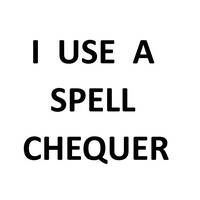 Not Yet Replaced By AI
Not Yet Replaced By AIThis transcription item is now locked to you for editing. To release the lock either Save your changes or Cancel.
This lock will be automatically released after 60 minutes of inactivity.